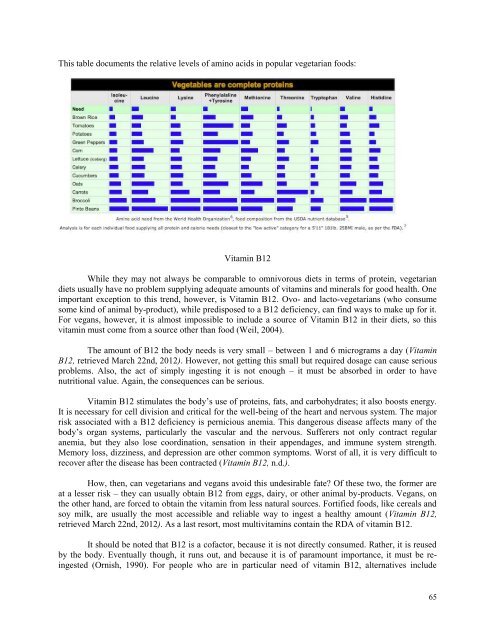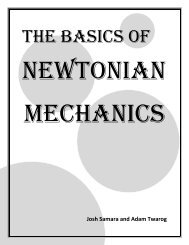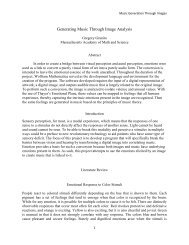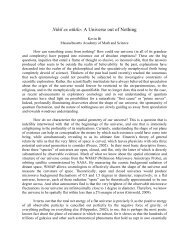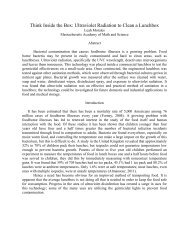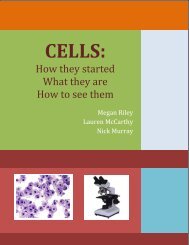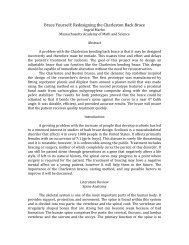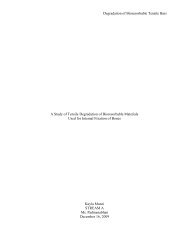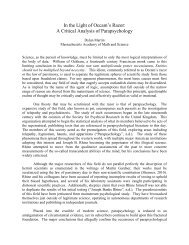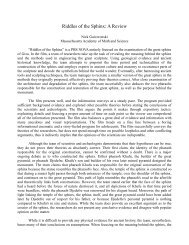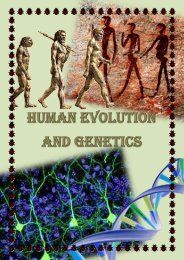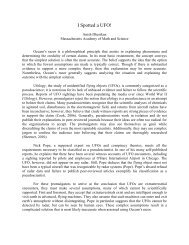Got Food? - the Scientia Review
Got Food? - the Scientia Review
Got Food? - the Scientia Review
Create successful ePaper yourself
Turn your PDF publications into a flip-book with our unique Google optimized e-Paper software.
This table documents <strong>the</strong> relative levels of amino acids in popular vegetarian foods:<br />
Vitamin B12<br />
While <strong>the</strong>y may not always be comparable to omnivorous diets in terms of protein, vegetarian<br />
diets usually have no problem supplying adequate amounts of vitamins and minerals for good health. One<br />
important exception to this trend, however, is Vitamin B12. Ovo- and lacto-vegetarians (who consume<br />
some kind of animal by-product), while predisposed to a B12 deficiency, can find ways to make up for it.<br />
For vegans, however, it is almost impossible to include a source of Vitamin B12 in <strong>the</strong>ir diets, so this<br />
vitamin must come from a source o<strong>the</strong>r than food (Weil, 2004).<br />
The amount of B12 <strong>the</strong> body needs is very small – between 1 and 6 micrograms a day (Vitamin<br />
B12, retrieved March 22nd, 2012). However, not getting this small but required dosage can cause serious<br />
problems. Also, <strong>the</strong> act of simply ingesting it is not enough – it must be absorbed in order to have<br />
nutritional value. Again, <strong>the</strong> consequences can be serious.<br />
Vitamin B12 stimulates <strong>the</strong> body‘s use of proteins, fats, and carbohydrates; it also boosts energy.<br />
It is necessary for cell division and critical for <strong>the</strong> well-being of <strong>the</strong> heart and nervous system. The major<br />
risk associated with a B12 deficiency is pernicious anemia. This dangerous disease affects many of <strong>the</strong><br />
body‘s organ systems, particularly <strong>the</strong> vascular and <strong>the</strong> nervous. Sufferers not only contract regular<br />
anemia, but <strong>the</strong>y also lose coordination, sensation in <strong>the</strong>ir appendages, and immune system strength.<br />
Memory loss, dizziness, and depression are o<strong>the</strong>r common symptoms. Worst of all, it is very difficult to<br />
recover after <strong>the</strong> disease has been contracted (Vitamin B12, n.d.).<br />
How, <strong>the</strong>n, can vegetarians and vegans avoid this undesirable fate? Of <strong>the</strong>se two, <strong>the</strong> former are<br />
at a lesser risk – <strong>the</strong>y can usually obtain B12 from eggs, dairy, or o<strong>the</strong>r animal by-products. Vegans, on<br />
<strong>the</strong> o<strong>the</strong>r hand, are forced to obtain <strong>the</strong> vitamin from less natural sources. Fortified foods, like cereals and<br />
soy milk, are usually <strong>the</strong> most accessible and reliable way to ingest a healthy amount (Vitamin B12,<br />
retrieved March 22nd, 2012). As a last resort, most multivitamins contain <strong>the</strong> RDA of vitamin B12.<br />
It should be noted that B12 is a cofactor, because it is not directly consumed. Ra<strong>the</strong>r, it is reused<br />
by <strong>the</strong> body. Eventually though, it runs out, and because it is of paramount importance, it must be reingested<br />
(Ornish, 1990). For people who are in particular need of vitamin B12, alternatives include<br />
65


